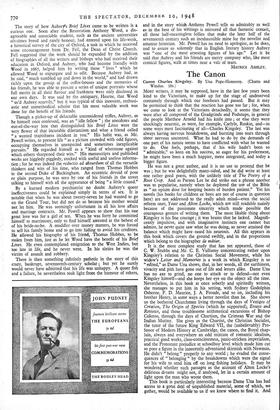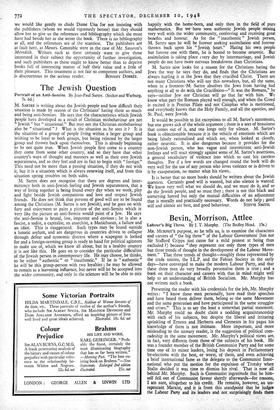The Canon
MOST writers, it may be supposed, have in the last few years been kind to the Victorians, to make up for the stage of undeserved contumely through which our forebears had passed. But it may be permitted to think that the reaction has gone too far ; for, when we come to look at the Victorians detachedly, it seems that they were after all composed of the Gradgrinds and Podsnaps, in general the people Matthew Arnold had his knife into ; or else they were shockingly neurotic, as were, for example, Carlyle, Ruskin, and—in some ways most fascinating of all—Charles Kingsley. The last was always having nervous breakdowns, and bursting into tears through sheer nervous uncontrol. What he had to do by the demands of one part of his nature seems to have conflicted with what he wanted to do. One feels, perhaps, that if his wife hadn't been so " admirable," so keen on his success, so eager for his preferment, he might have been a much happier, more integrated, and today a bigger figure.
He was not a great author, and it is no use to pretend that he was ; but he was'delightfully many-sided, and he did write at least one rather good poem, with the unlikely title of The Poetry of a Root Crop. And as Parson Lot he did strike out a phrase another was to popularise, namely when he deplored the use of the Bible as " an opium dose for keeping beasts of burden patient." Yet his novels (his books for children or boys are not of course in question here) are not addressed. to the really adult mind—eVen the social reform ones, Yeast and Alton Locke, which are still readable mainly because of the passionate sincerity which made possible the courageous gesture of writing them. The most likable thing about Kingsley is his fine courage ; it was brains that he lacked. Magnifi- cently impulsive, and with imaginative instincts one cannot but admire, he never quite saw what he was doing, so never attained the balance which might have eased his neurosis. All this appears in this book which covers the ground swiftly, and in the proportions which belong to the biographer de métier.
It is the most complete study that has yet appeared, those of C. W. Stubbs and Mr. C. E. Vulliamy concentrating rather upon Kingsley's relation to the Christian Social Movement, while his widow's Letter and Memories is a work in which Kingsley is so "edited," as Dame Una shows, that, in her words, all the earthiness, vivacity and pith have gone out of life and letters alike. Dame Una has no axe to grind, no one to attack or to defend—not even Kingsley himself—and she keeps her eye on the object all the time. Nevertheless, in this book at once soberly and spiritedly written, she manages to put him in his setting, with Sydney Godolphin Osborne, F. D. Maurice, J. A. Froude, and so on, including his brother Henry, in some ways a better novelist than he. She shows us the bothered Churchman living through the days of Vestiges of Creation, The Origin of Species (which he supported), Essays and Reviews, and those troublesome arithmetical excursions of Bishop Colenso, through the days of Chartism, the Crimean War and the Indian Mutiny. She gives us the Chartist, the Christian Socialist, the tutor of the future King Edward VII, the (unbelievably) Pro- fessor of Modern History at Cambridge, the canon, the Royal chap- lain, always and everywhere an odd mixture of romantic idealism, practical good works, class-consciousness, panic-stricken imperialism, and the Protestant prejudice at schoolboy- level which made him cut so poor a figure in the innocently adventured skirmish with Newman. He didn't " belong " properly to any world ; he evaded the conse- quences of " belonging " by the breakdowns which were the signal for his wife to send him off on long fishing holidays. It may be wondered whether such passages as the account of Alton Locke's delirious dreams might not, if analysed, let in a certain amount of light upon the man who wrote them.
This book is particularly interesting because Dame Una has had access to a great deal of unpublished material, some of which, we gather, would be available to us if we knew where to find it. And we would like gently to chide Dame Una for not insisting with the publishers (whom we would vigorously berate) that they should allow her to give us the references and bibliography which she must have had beside her as she wrote the book. There is no bibliography at all, and the references are of the scantiest. The publishers are at fault here, as Messrs. Constable were in the case of Mr. Sassoon's Meredith. Writers such as these certainly want to give those interested in their subject the opportunity of further investigation, and such publishers as these ought to know better than to deprive [books full of interesting matter of half their value and a little of their pleasure. This treatment is not fair .to competent authors, and















































 Previous page
Previous page